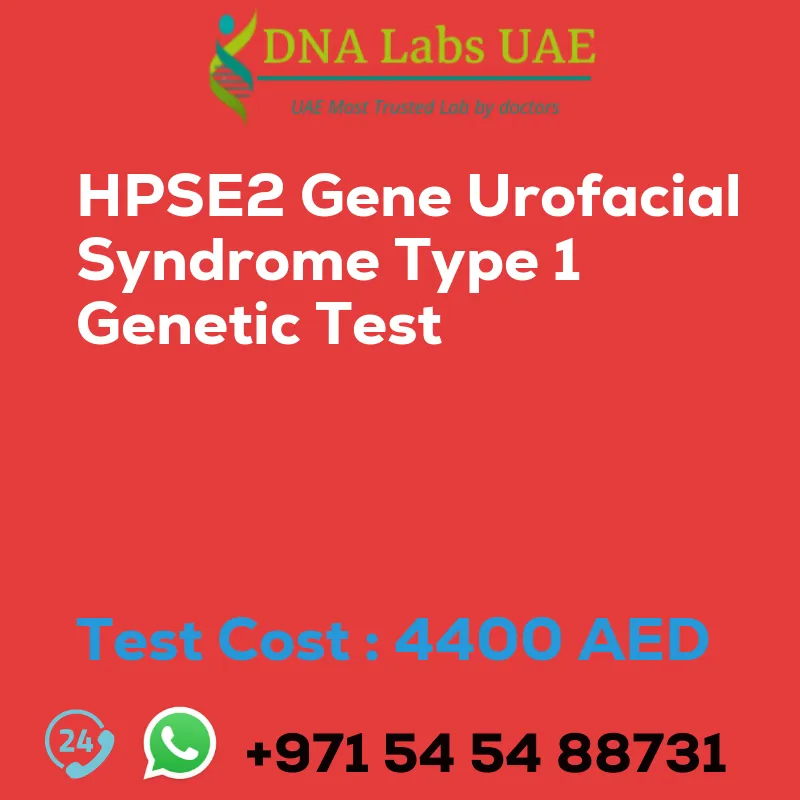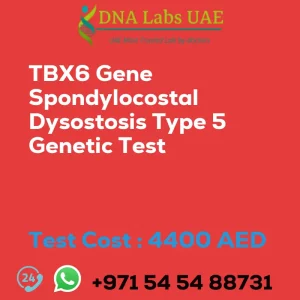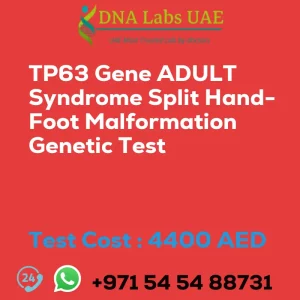HPSE2 Gene Urofacial Syndrome Type 1 Genetic Test
Welcome to DNA Labs UAE, where we offer the HPSE2 Gene Urofacial Syndrome Type 1 Genetic Test. This test helps in diagnosing and understanding Urofacial Syndrome Type 1, also known as Ochoa Syndrome. Read on to learn more about the test details, components, price, and more.
Test Components
- Test Name: HPSE2 Gene Urofacial Syndrome Type 1 Genetic Test
- Price: 4400.0 AED
- Sample Condition: Blood or Extracted DNA or One drop Blood on FTA Card
- Report Delivery: 3 to 4 Weeks
- Method: NGS Technology
- Test Type: Dysmorphology
- Doctor: Pediatrics
- Test Department: Genetics
Pre Test Information
Before undergoing the HPSE2 Gene Urofacial Syndrome Type 1 Genetic Test, it is important to provide the clinical history of the patient. Additionally, a genetic counseling session will be conducted to draw a pedigree chart of family members affected by Urofacial Syndrome Type 1. This will help in understanding the genetic basis of the condition and guide the testing process.
Test Details
The HPSE2 gene is associated with Urofacial Syndrome Type 1, also known as Ochoa Syndrome. This syndrome is characterized by urinary tract dysfunction and abnormal facial expressions. To identify mutations or variations in the HPSE2 gene responsible for the syndrome, we use NGS (Next-Generation Sequencing) technology. NGS allows for the analysis of multiple genes simultaneously.
During the NGS genetic testing process, the DNA of the individual suspected to have Urofacial Syndrome Type 1 is extracted from a blood or saliva sample. This DNA sample is then sent to our specialized laboratory for analysis. Our laboratory will sequence the DNA to detect any changes or mutations in the HPSE2 gene. The results of the NGS genetic test will provide valuable information for healthcare professionals to diagnose the condition, predict the risk of developing the syndrome, and guide treatment decisions.
If you suspect that you or a family member may have Urofacial Syndrome Type 1, we recommend undergoing the HPSE2 Gene Urofacial Syndrome Type 1 Genetic Test. Our expert team at DNA Labs UAE is dedicated to providing accurate and reliable genetic testing services to help improve the lives of individuals affected by genetic disorders.
| Test Name | HPSE2 Gene Urofacial syndrome type 1 Genetic Test |
|---|---|
| Components | |
| Price | 4400.0 AED |
| Sample Condition | Blood or Extracted DNA or One drop Blood on FTA Card |
| Report Delivery | 3 to 4 Weeks |
| Method | NGS Technology |
| Test type | Dysmorphology |
| Doctor | Pediatrics |
| Test Department: | Genetics |
| Pre Test Information | Clinical History of Patient who is going for HPSE2 Gene Urofacial syndrome type 1 NGS Genetic DNA Test. A Genetic Counselling session to draw a pedigree chart of family members affected with HPSE2 Gene Urofacial syndrome type 1 NGS Genetic DNA Test gene HPSE2 |
| Test Details |
The HPSE2 gene is associated with Urofacial syndrome type 1, also known as Ochoa syndrome. This syndrome is characterized by urinary tract dysfunction and abnormal facial expressions. NGS (Next-Generation Sequencing) is a genetic testing method that allows for the analysis of multiple genes simultaneously. In the context of Urofacial syndrome type 1, NGS genetic testing can be used to identify mutations or variations in the HPSE2 gene that may be responsible for the syndrome. NGS genetic testing involves sequencing the DNA of an individual to detect any changes or mutations in specific genes of interest. This can help in diagnosing the condition, predicting the risk of developing the syndrome, and guiding treatment decisions. If a person is suspected to have Urofacial syndrome type 1, their DNA can be extracted from a blood or saliva sample and sent to a specialized laboratory for NGS genetic testing. The laboratory will analyze the HPSE2 gene for any mutations or variations that may be associated with the syndrome. The results of the NGS genetic test can provide valuable information for healthcare professionals to better understand the genetic basis of Urofacial syndrome type 1 and develop personalized treatment plans for affected individuals. |








